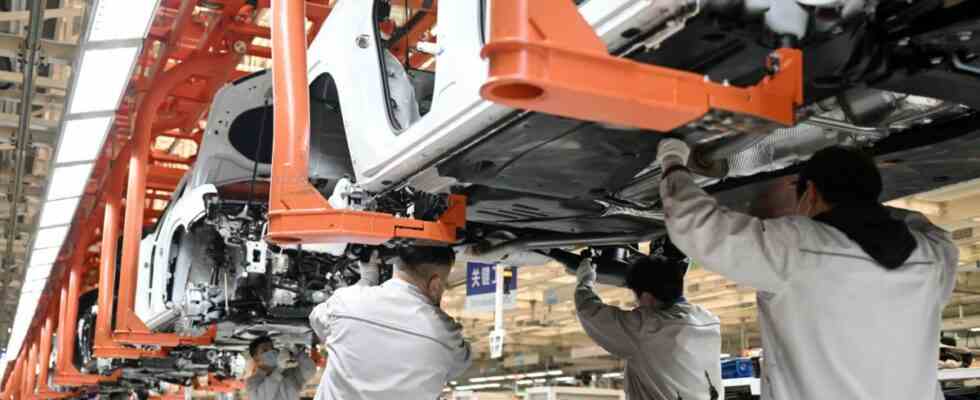How important China is for Volkswagen can be seen in a few figures: The multi-brand group sells four out of ten cars sold in this country. The VW brand was the market leader by a wide margin for many years. How difficult Volkswagen’s situation is in China can also be seen in a few figures: the group delivered 3.2 million vehicles in China. That was four percent less than in 2021 and less than in almost ten years. Meanwhile, however, the overall Chinese market grew by two percent to around 21 million vehicles.
Almost 40 years ago, the group began to conquer the Chinese market under the leadership of the recently deceased Carl Hahn. Now, however, the car company is threatening to become one of many in China: Because the competition is getting tougher, because the company itself is technically too weak, because it has rested on its laurels. In addition, the political circumstances are becoming increasingly difficult. In short: China is the biggest construction site for Volkswagen, it is about as big as the difficulties with the software, with one being related to the other.
The man who is supposed to fix it now is called Ralf Brandstätter. He is from Lower Saxony, originally trained as a fitter at VW and worked his way up in the group. Perhaps a homegrown product is suitable for this daunting task, which is about strategy, but also about identity: Brandstätter wants to make Europe’s largest carmaker a little more Chinese. The 55-year-old has been in charge of Beijing since August. During this time he has experienced a lot: quarantine, lockdowns and the chaotic end of the zero-Covid policy with the huge wave of infections. When this is over, they can finally look ahead again at Volkswagen, says Brandstätter on his first home visit to Germany.
Digitization is the key issue
In his view, there are two key reasons why Volkswagen must stay in China: “The size of the market and the exceptional innovative strength.” Digitization is the key issue. Autonomous driving functions such as distance control, lane changes as well as traffic jam and parking pilot are a “must have”. Anyone who doesn’t offer cars that drive largely independently on the motorway in two or three years “will probably no longer be able to sell vehicles”. In addition, Chinese customers, who are on average significantly younger than those in Europe, want digital entertainment in their cars.
Ralf Brandstätter originally trained as a fitter at VW.
(Photo: Dietmar Theis/Volkswagen AG)
On a technical level, the decoupling has long been underway: the requirements are now so different that it is no longer possible to simply bring a European car to China, explains Brandstätter. It is necessary to develop “in China for China”, because the differences are likely to increase. So far, everything has taken too long: “The Chinese develop a new car in two and a half years, VW needs a little less than four years,” criticizes Brandstätter. “China Speed” is what he calls what Volkswagen should take as an example.
However, that came relatively late in Wolfsburg: the former CEO Herbert Diess was responsible for China himself until they realized in the group: It doesn’t work that way, especially not in times of the corona pandemic.
Brandstätter now wants to set up a “second company headquarters” in Beijing. The regional research center is being set up in the eastern Chinese province of Anhui, which will focus entirely on the development of electric cars for the Chinese market. When it comes to topics such as artificial intelligence, Volkswagen relies on local partners such as Horizon Robotics, one of the global technology leaders in automated driving systems. VW wants to put two billion euros into the joint venture. The number of in-house software developers in China is to be doubled to 1,200. According to Brandstätter, this is already reflected in the first successes: Developing a new game ready for series production now takes “only” half a year.
In the e-car business, which now accounts for a quarter of the market, Volkswagen is lagging behind. Chinese homegrown BYD dominated last year with around 1.9 million deliveries. US competitor Tesla came to 440,000, while Volkswagen only had around 150,000. VW is not alone with its problems. “The situation of the German automobile manufacturers is extremely tense,” wrote market expert Stefan Bratzel in a recent publication investigation of the Center of Automotive Management (CAM) in Bergisch Gladbach. BMW and Mercedes-Benz could not keep up “by far with the pace of the leading group”. At the same time, Chinese manufacturers are increasingly attacking other markets, even in Germany: brands like Nio or MG can also be bought here – and they get decent ratings.
The “In China for China” strategy does not only have an economic background. Like many other German companies, Volkswagen is thus following the political line of the Chinese government, which is striving for greater technological autonomy. But it’s also a safeguard: Should ruler Xi Jinping decide to attack Taiwan, the economic consequences would be “serious,” as Brandstätter puts it. In concrete terms, at least tough sanctions from the West are likely to follow. However, those parts of the company that are 100 percent “localized” in China could then probably continue to work.
Not only Taiwan is likely to give Brandstätter a headache. When the conversation turns to the Uyghur province of Xinjiang and the VW plant there, he rubs his forehead. He then reiterates that the plant is a very small one, and that Volkswagen is “doing everything in our power” to “ensure good working conditions.” However, he has not yet been able to form his own picture. The trip to the isolated region had already been planned twice, and failed twice, apparently due to Corona requirements. A third attempt is planned for February, but only a small company delegation, without journalists. In China, the government makes the rules of the game, even billionaire corporations like Volkswagen have to follow.

